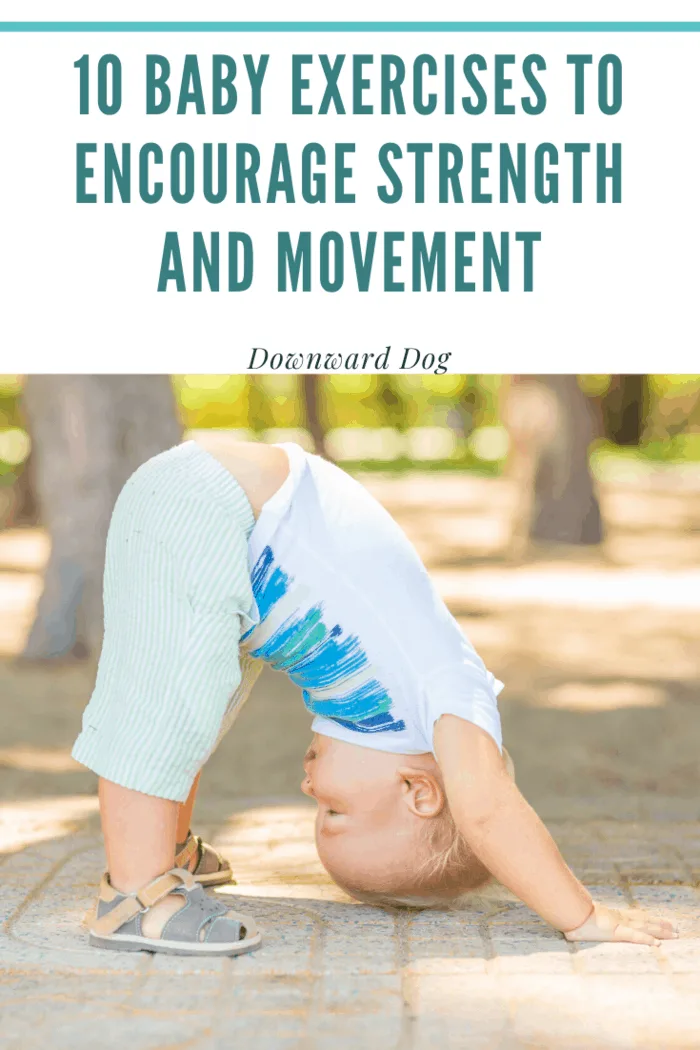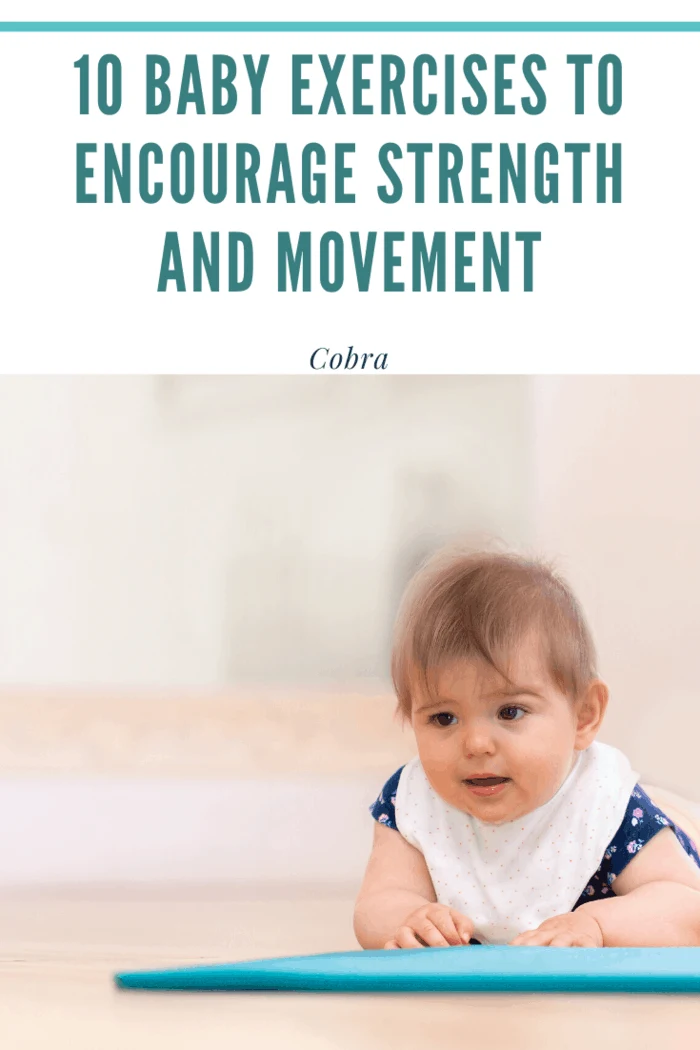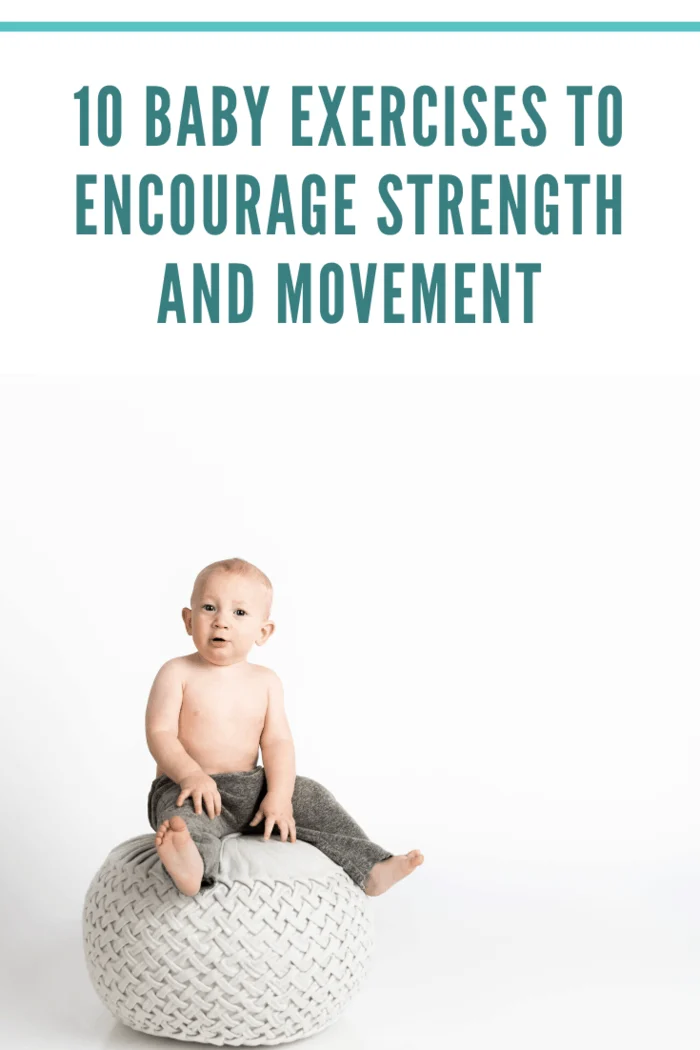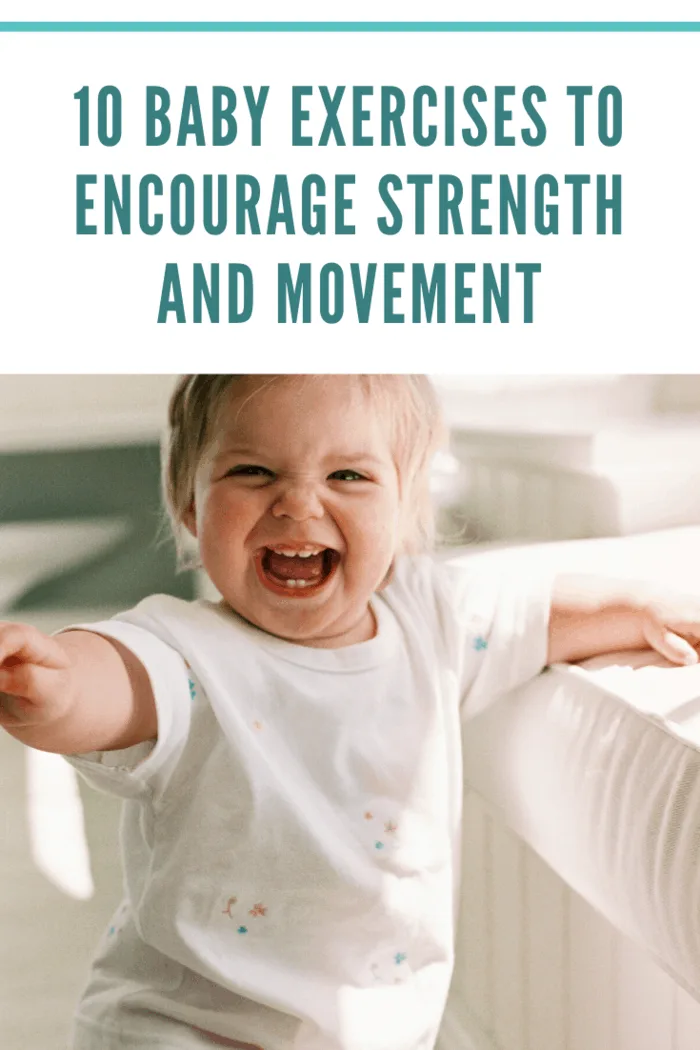From the moment we’re born, our bodies crave movement.
Many people don’t realize that this reality proves just as true for infants as it does for kids and adults.
When it comes to bringing home baby, there’s no instruction manual.
And there sure as heck is no guide to infant exercise!
Yet, fitness moves prove essential to developing a strong neck, the ability to maintain a crawling pose, and more.
Where to start? Keep reading for a breakdown of the ten best baby exercises to get infants moving.

10 Baby Exercises to Encourage Strength and Movement
1. Downward Facing Dog
Your baby won’t be capable of doing downward facing dog until they’re between six and ten months old
. In other words, about the time they’re starting to explore crawling.
But it’s an excellent exercise when they reach this developmental stage.
What’s the best way to get babies encouraged to do it?
Start by modeling the pose to them yourself.
Before you know it, your baby will copy you and get into the pose, too.
Variations of downward dog include playing “peekaboo” while you work on a little arm and leg strength.

2. Happy Baby
Your baby may already get into happy baby pose regularly.
Active.com can show you how.
That said, it’s worth encouraging the posture because it comes with countless health benefits.
Have your little one lie on their back and put their legs in the air.
Then, encourage them to hold onto their feet while gently swaying back and forth.
This pose opens up hip muscles and stimulates digestion.
3. Cobra Pose
How to build neck muscles?
For babies, the cobra pose, as demonstrated by MSN.com translates into “tummy time.”
This pose was made for them.
Have your baby lie on their tummy, with their elbows bent and their arms flat on the floor in front of them. (Arm position isn’t essential, so don’t sweat the small stuff!)
While lying on the floor, encourage them to hold up their head, which strengthens their neck muscles and improves their overall motor skills.
Although two-month-old babies will struggle at first, their necks will strengthen quickly.
This pose gives the back of your baby’s head a break and protects against positional plagiocephaly (learn more on aans.org) (a.k.a. flattened head shape).

4. Butterfly Twist
In yoga, this next move is known as bound angle pose or supta baddha konasana.
Or, you may think of it as cobbler’s pose while lying down.
To help your baby do the pose, lie them on their back and then adjust the soles of their feet so they touch.
Their legs will create a butterfly shape.
Then, as you encourage your baby to extend their arms to the side, gently bring their feet towards their tummy.
You can also create a gentle twist for your little one by moving their legs slowly from side to side while maintaining the butterfly pose.
The gentle rocking back and forth motion will help relax your baby.
As a result, it’s a fantastic pre-bedtime routine.
5. Time in the Jumperoo
One of the best ways to strengthen your baby’s body and prepare for the rigors of walking is time spent in a kid’s jumperoo.
Look for one with a well-cushioned seat and fabric-covered steel springs to keep the baby’s fingers safe.
The jumper should also feature vibrant colors and come with interesting toy animals and visual features to keep babies engaged and entertained.
The best jumperoos turn 360 degrees, which allows babies to turn all the way around.
It should also provide them with structure and support while allowing them to build strength by jumping and experimenting with walking.
6. Assisted Crawling
Besides jumperoos, we also highly recommend assisted crawling with your baby.
All you need is a towel.
Fold the towel several times lengthwise and then place it on the ground.
Put baby tummy down on top of it.
Then, use both hands to gently lift each side so that your baby’s chest rises and they can start to experience a crawling position.
This activity will help your baby go through the motions without the added stress of gravity.
This remains one of the best activities when it comes to baby raising games.
7. Balancing on a Stool
Without balance, we wouldn’t be able to walk correctly.
To help infants begin to master the necessary muscle strength associated with balance, have them practice sitting on a stool.
This stool should sit low enough to the ground that their feet rest on the floor, and you should sit behind them or nearby for the sake of safety.
To begin, have your baby stand up and pick any toy they’d like off the floor.
Then, have them sit down on the stool holding the toy.
That way, they have something to occupy their attention as they learn the basics of proper balance.

8. Furniture Cruising
As your baby gains more confidence standing up, they’ll still face a learning curve when it comes to bipedal balance.
Letting them hold one of your hands while keeping their other on the furniture will help with mastery of the balance required for walking.
This activity proves safer and more beneficial than using baby walkers, too.
The American Academy of Pediatrics advises avoiding baby walkers altogether as they can lead to injuries.

9. Baby Bounce
Another fun exercise that helps babies develop better balance is called the baby bounce.
It’s also an entertaining activity that’ll keep your infant happy and engaged.
While kneeling on the floor, place your baby in a standing position on your lap.
Then, start bouncing them up and down on your legs.
As you hold your baby’s hands, move their arms up and down to help them get into the bouncing action.
10. Toy Catch
As your baby grows, they develop hand-eye coordination.
A variety of exercises can help you encourage this development.
These include blowing bubbles towards them, which they can try to track with their eyes and catch with their hands.
It also involves finding a soft toy or a brightly colored ribbon and using this to play a gentle game of catch.
Have your baby sit on the floor while doing this activity so that they can continue to develop their core strength, balance, and vision.
Why Baby Exercises?
According to the Society of Health and Physical Educators, preschool-aged kids need to move daily.
Babies included.
Baby exercises help infants develop better hand-eye coordination, core strength, leg strength, and the physical achievements necessary to begin walking and participating in other activities.
Ready for more tips to help your baby reach its developmental milestones?
Or, for other quality ways to spend time together?
Browse our blog for handy mommy tips.
You and your baby will love these ten best baby exercises to get infants moving and encourage strength and movement.
